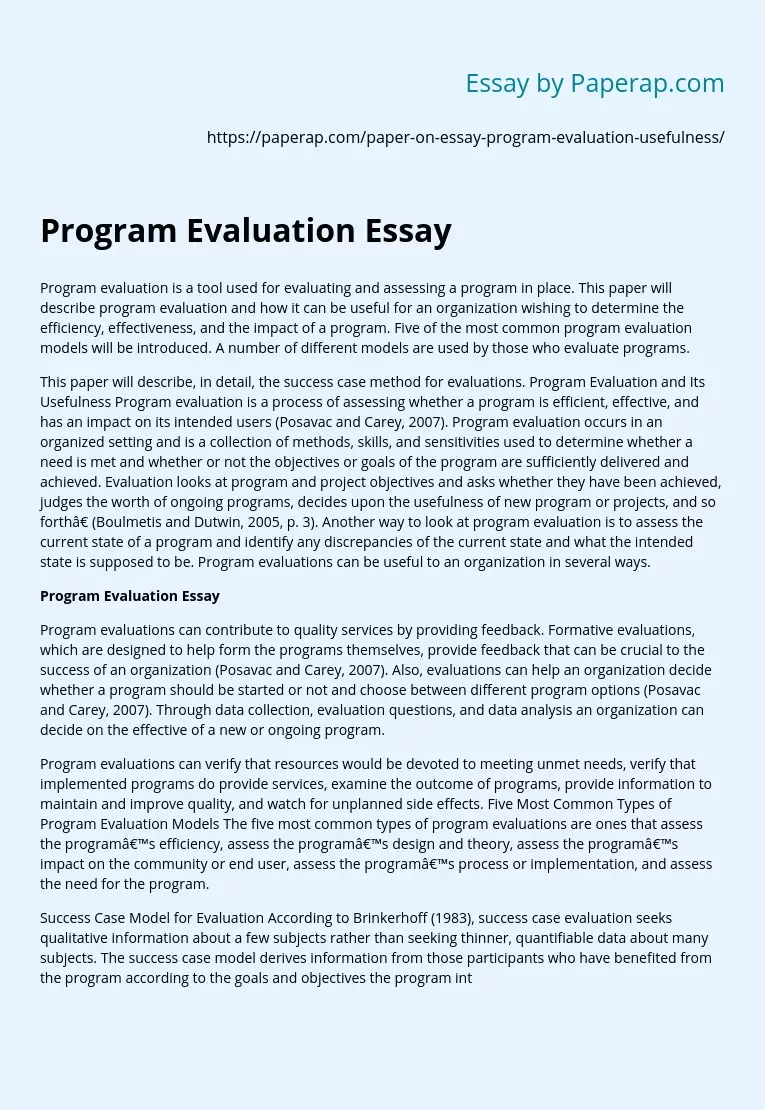Program Evaluation Essay
Program evaluation is a tool used for evaluating and assessing a program in place. This paper will describe program evaluation and how it can be useful for an organization wishing to determine the efficiency, effectiveness, and the impact of a program. Five of the most common program evaluation models will be introduced. A number of different models are used by those who evaluate programs.
This paper will describe, in detail, the success case method for evaluations. Program Evaluation and Its Usefulness Program evaluation is a process of assessing whether a program is efficient, effective, and has an impact on its intended users (Posavac and Carey, 2007).
Program evaluation occurs in an organized setting and is a collection of methods, skills, and sensitivities used to determine whether a need is met and whether or not the objectives or goals of the program are sufficiently delivered and achieved. Evaluation looks at program and project objectives and asks whether they have been achieved, judges the worth of ongoing programs, decides upon the usefulness of new program or projects, and so forth” (Boulmetis and Dutwin, 2005, p.
3). Another way to look at program evaluation is to assess the current state of a program and identify any discrepancies of the current state and what the intended state is supposed to be. Program evaluations can be useful to an organization in several ways.
Program Evaluation Essay
Program evaluations can contribute to quality services by providing feedback. Formative evaluations, which are designed to help form the programs themselves, provide feedback that can be crucial to the success of an organization (Posavac and Carey, 2007). Also, evaluations can help an organization decide whether a program should be started or not and choose between different program options (Posavac and Carey, 2007). Through data collection, evaluation questions, and data analysis an organization can decide on the effective of a new or ongoing program.
Program evaluations can verify that resources would be devoted to meeting unmet needs, verify that implemented programs do provide services, examine the outcome of programs, provide information to maintain and improve quality, and watch for unplanned side effects. Five Most Common Types of Program Evaluation Models The five most common types of program evaluations are ones that assess the program’s efficiency, assess the program’s design and theory, assess the program’s impact on the community or end user, assess the program’s process or implementation, and assess the need for the program.
Success Case Model for Evaluation According to Brinkerhoff (1983), success case evaluation seeks qualitative information about a few subjects rather than seeking thinner, quantifiable data about many subjects. The success case model derives information from those participants who have benefited from the program according to the goals and objectives the program intends to have. This feedback may be helpful to others who have not benefitted as well from the program. Success cases may be studies briefly through short interviews with a few trainees or through more elaborate approaches, such as work-sample analysis, records analysis and observation” (Brinkerhoff, 1983, para. 9). Some uses of the success case method are illustrating that the program has a positive impact, modifying and strengthening the program being evaluated, and building data collection methods to determine the extent of the program’s impact (Brinkerhoff, 1983). Evaluation questions often associated with the success case model ask: How has the program been used? What benefits are results of the program?
What problems occurred during or because of the program? Conclusion Program evaluation is necessary to accurately examine a program’s efficiency, effectiveness, or impact of the particular program through the means evaluation questions, data collection, and data analysis. These types of evaluations can provide useful feedback to organizations to examine the outcomes of a program, verify that the goals and objectives of a program are met, provide information to choose between different programs, provide information to improve quality of a program, and watch for unplanned side effects.
The five most common evaluation models address the need for a program, the efficiency of a program, the impact of a program, the theory of a program, and the implementation of a program. The success case model of evaluation seeks information on a select group of participants who have experienced success from the program. Feedback from the program can help to modify or strengthen the program, help others who have yet to benefit from the program, and determine the impact of the program on its participants.
References Brinkerhoff, R. O. (August 1983). The success case: a low-cost, high-yield evaluation. Training and Development Journal. Retrieved December 6, 2010, from www. ebscohost. com. Boulmetis, J. & Dutwin, P. (2005). The ABCs of evaluation: Timeless techniques for program and project managers. (2nd ed. ). San Francisco: Jossey-Bass/John Wiley & Sons. Posavac, E. , & Carey, R. (2007). Program evaluation: Methods and case studies. (7th ed. ). Upper Saddle River, NJ: Pearson/Prentice Hall.
Program Evaluation Essay. (2019, Dec 05). Retrieved from https://paperap.com/paper-on-essay-program-evaluation-usefulness/

